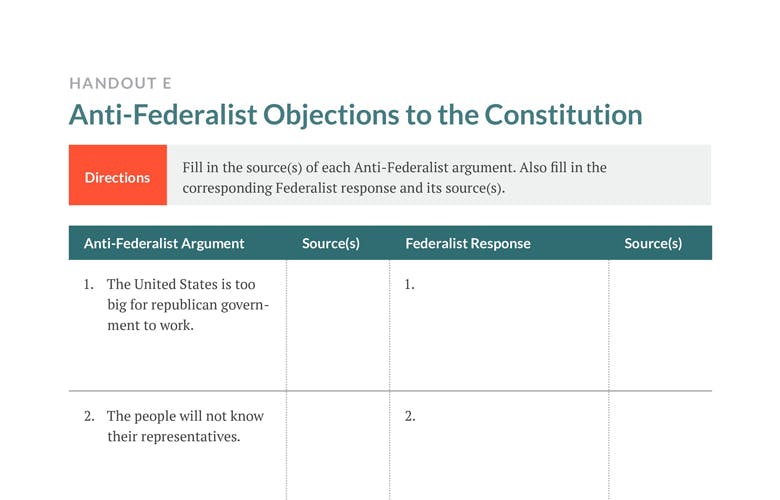Handout E: Anti-Federalist Objections to the Constitution
Anti-Federalist Objections to the Constitution
Directions: Fill in the source(s) of each Anti-Federalist argument. Also fill in the corresponding Federalist response and its source(s).
(Graphic Organizer in PDF)
CRITICAL THINKING QUESTIONS
- What is the continuing relevance of the Federalist and Anti-Federalist positions with respect to the principle of representation and other constitutional principles?
- Analyze and paraphrase the following statements.
a. “It is essential to such a government [a republic] that it be derived from the great body of the society, not from an inconsiderable proportion or a favored class of it,” and that “the persons administering it be appointed, either directly or indirectly, by the people [for a limited time and based on good behavior.] Madison, Federalist No. 39
b. “The federal government will be [limited] by the authority of a paramount Constitution.” Madison, Federalist No. 53
c. “The aim of every political constitution is, or ought to be, first to obtain for rulers men who possess most wisdom to discern, and most virtue to pursue, the common good of the society; and in the next place, to take the most effectual precautions for keeping them virtuous whilst they continue to hold their public trust. The elective mode of obtaining rulers is the characteristic policy of republican government. The means relied on in this form of government for preventing their degeneracy are numerous and various. The most effectual one, is such a limitation of the term of appointments as will maintain a proper responsibility to the people.” Madison, Federalist No. 57 - To what extent do you agree with the principles that Madison expressed in each of the three passages quoted above?
- To what extent has the American republic lived up to Madison’s confidence expressed in The Federalist?
- In a republic that functions as Madison believed it should, what is the main responsibility of the elected representatives? What is the responsibility of the electorate?
